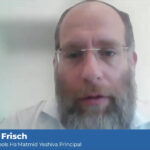At our Research, Training and Development Center in Tel Aviv, exciting and innovative programs are flourishing.
We strive to meet the educational and personal needs of ALL our students. How do we guide students to develop skills and tools for success? And how do we equip educators with the skills and tools to champion their students?
Read on about our:
- Institute for Positive Psychology
- The Unit for Learning Differences, Learning Disabilities and Difficulties
- Pilots and Continued Development
Institute for Positive Psychology
The Institute designs interventions that will influence the mental well-being, sense of efficacy and motivation of students. The Institute conducted the following activities this year:
A diploma training program – sixth year
Training counselors specializing in the development and implementation of principles of positive psychology in schools, in partnership with the Interdisciplinary Center (220 hours)
The purpose of the training is to impart the ability to develop, implement and deliver programs in the schools in accordance with the concept of positive psychology. Each of the 22 participants develops and implements activities and intervention programs in the schools where they work, with the students, teachers and parents.
Participants include principals, counselors, school officials and teachers from all sectors (secular and religious Jews, Arab, Bedouin and Druze) who want change. The course was conducted in collaboration with the Adler Institute.
Developing interventions in positive psychology
Two workshops were developed: “The science of happiness”, a course for students that will be taught as a pilot in 2016 as part of general knowledge lessons. The course will be given by teachers trained at the Center. “From parent’s hat to teacher’s hat” – a pilot underway at Afridar Sci-Tech School, Ashkelon, a teacher’s in-service course on a unique approach to parent-teacher relations – the teachers viewing themselves as the parent for different issues in relationships, and acquiring practical tools from the world of positive psychology to promote parent-teacher dialogue and good class and school climate.
Hope and Motivation
A two-year systematic and structured program, developed by the Learning Skills Center in partnership with Tel Aviv University, aims at increasing motivation among students to cope effectively with academic tasks in school. The program is designed for pedagogical and emotional coaching and is guided by the concept of positive psychology. The program deals with strengthening internal resources, while focusing on the students’ strong points; it teaches students to set social and academic goals and also provides them with effective learning tools and strategies to help them achieve these goals.
The program is delivered by a teacher who works with a small group of up to ten students in one weekly session throughout the year. The teachers are trained throughout the year by an instructor from the Learning Skills Center. The program is accompanied by research and indicates an increase in the students’ and the teachers’ sense of efficacy, as well as improved achievements. This year there were 14 teacher training programs in 12 schools. 320 teachers are participating and applying the program with some 1,625 students. From conversations with principals and counselors, most of the courses are successful and teachers report a meaningful experience that has given them tools.
“Get a passing grade”
School in-service course for teachers (30 hours) aims to provide practical tools developed the institute for positive psychology to enhance the sense of wellbeing among teachers and students. This year the course was delivered at 8 schools (Arab sector, orthodox, “secular”) to 157 teachers, who expressed a high level of satisfaction with the course contents and applications.
Conference participation and presentations
For several years, the Institute for Positive Psychology has been active in the forum of researchers from leading universities and colleges for positive psychology, even though it is not an academic body itself. At a meeting held at Tel Aviv University, the Institute presented a workshop developed at the Center entitled “Feedback as a tool to cultivate thinking that develops” according to the book by Professor Carol Duek. The workshop was received with great interest.
The forum meeting in February was hosted at the Learning Skills Center, where the holistic model was presented as a community-wide model that implements the principles of positive psychology to create mental wellbeing among students as a basis for learning and growth.
Initiatives and collaborations
“A Dish of Happiness” – an inter-generational meeting to discuss the question of the causes of human happiness was held at Naomi Shemer Sci-Tech School, Gan Yavneh. At this encounter facilitated by counselors from the Center between senior citizens studying at the school and its students, each participant molded his own ‘dish of happiness’ using plastic materials. This was followed by a debate about the causes of happiness and a lecture on the topic.
Collaboration with OR-TOV
In collaborated with Israel Sci-Tech’s Or-Tov program (Or-Tov, ‘A light for the good’, is our large-scale leadership, social values and volunteering program, we implemented the Naama project – a meeting with girls from Daliat el-Carmel School, in Daliat el-Carmel, doing national service to empower them – a ‘strengths’ workshop.
The Unit for Learning Differences, Learning Disability and other learning Difficulties
This Unit concerns itself with advancing those students who struggle with learning disabilities and other learning difficulties. The Unit developed a model which has also been adopted by the Ministry of Education. The model includes work on three tiers:
- Mapping and identifying students with learning difficulties;
- Didactic assessment for those students who have been pinpointed in order to identify their strengths and difficulties;
- Providing recommendations for methods of learning and testing and treating students with learning disabilities in schools through workshops for the development of learning skills, advanced study courses for teachers to develop relevant teaching skills, and workshops for parents.
The model is implemented by 45 didactic assessors – professionals working at the schools as part of the school staff. For them the Center is the place for professional development: they receive individual and group counseling and instruction from the Center staff. This year the Center has 9 new didactic assessors following the expansion of the scope of hours given to the assessors at the Ministry of Economy schools, and the addition of new schools.
The program operated this year in 35 schools: 15 schools under the supervision of the Ministry of Economy, and 20 comprehensive schools under the supervision of the Ministry of Education. These include: 5 schools in the Bedouin sector, 2 in the Druze sector, and two Haredi yeshivas.
At the final meeting of the recent course, the assessors presented various activities they are conducting in the schools. We saw the wealth of activities working with teachers, parents and students on a range of topics we had trained them on during the year, such as “developing peers encouraging hope and motivation”, “instructing literature teachers in disciplinary literacy”, “training teachers in class management using principles of positive psychology”, “using a reading acceleration program emphasizing reading comprehension” and more.
Pilots and Continued Development
Piloting a virtual course
This pilot was conducted this year, integrating knowledge about learning disabilities and literature together with the head of literature teaching and the internet unit. The purpose of the course is to get to know about learning difficulties and disabilities and acquire tools to adapt the teaching of literature to these difficulties. The platform can cater to other text-based subjects once we have examined how successful this course format is.
Teacher observation and feedback to promote the quality of teaching in a heterogeneous class
There has been a recent rise in the need of the school community for a broader response to the needs of LD and struggling students studying in heterogeneous classes. This need has further increased, given the Ministry policy to provide a teaching-learning response to students throughout the learning continuum, as expressed in the directive on accommodations for the learning continuum and testing of November 2014.
Accordingly, we developed a process of feedback following class observation emphasizing consulting processes, with the aim of learning and professional development and in particular, adaptation of the teaching processes to the needs of LD and struggling students. Feedback on class observation is part of the counseling activities and of the cooperation between the didactic assessors and the teaching staff. It is also part of the didactic assessor’s job to guide teachers in adapting their teaching to the particular needs of LD and struggling students, based on the principles of positive psychology.
Accordingly, one session of the professional development of the assessors was devoted to feedback on class observation. The session included group work during which drafts were written and these were worked on by a small team and then written up as a procedure for class observation and feedback. This draft will be tried out in the field.
“Paths” Unit
This Unit deals with the development and implementation of “Paths” – effective learning/teaching workshops to strengthen the sense of efficacy and motivation. The workshops were developed in partnership with the School of Education at Tel Aviv University and are given by instructors who have been trained at the Center The workshops are given to students, and at the same time there are meetings for teachers and for parents.
In the workshops, students learn to recognize themselves as students. They become aware of their dominant learning style (visual, auditory, kinesthetic), acquire strategies for improving memory and organizing information, and acquire tools for time-management and for effective learning prior to exams. Also, they are provided with tools with which to “speak for themselves” through effective, constructive communication with teachers, so that they may receive effective assistance.
The “Paths” program is presently being implemented this year in 25 schools; some 2,000 hours were allocated to some 3700 students and teaching staff from the north of the country to the south, in a variety of formats, such as: entire age groups which received marathons or long courses; groups with common denominators such as ETGAR (Challenge) and MABAR classes. Furthermore, the workshops were given at schools as part of the “transitions” program in Israel Sci-Tech schools for students moving from 6th to 7th grade, and from 9th to 10th grade, during summer marathons, or at the beginning of the year. Feedback showed very high satisfaction both amongst the students and the teaching staff.
This year 15 workshops were given to parents of students in the program in several schools. The workshops showed the parents the importance of acquiring learning skills to improve achievements in general and skills necessary for the 21stcentury in particular.





